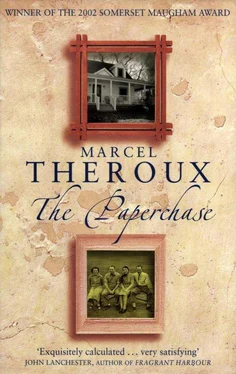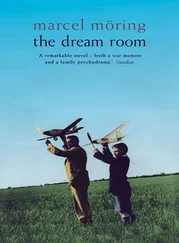The main building of the high school wasn’t old — a geometrical castle of pink bricks — but the extremes of temperature had weathered the track. On summer evenings it was a popular place to run, but it was relatively early and though I could hear the hollow thwack of tennis balls from the court on the other side of the softball pitch, the running track was empty.
Standing at the chain-link fence for balance, I stretched my calf muscles, then set off towards the start line and jogged slowly round. A catbird squawked in the pines around the track. I tried to imagine myself into Patrick’s pristine size-twelve running shoes.
Spring is a dangerous season for old men — you don’t have to be a poet to figure that out. Something in their blood starts bubbling at the approach of summer. It’s the time of year, after all, when life calls on the living to get up and at it. And who wants to admit he’s past the age when life called to him and meant it? Do anything but face that truth.
Mad with spring breezes, my Uncle Patrick had taken up jogging at the age of sixty-three.
Sixty-three. That’s a number to conjure with. Patrick always said that people’s numerical imaginations were very jaded. Between two and ninety-nine there’s not much to hold their attention. What he called zero and I call nought is mystical, inviolate, virginity. Number one is golden, primacy — the American obsession: One hundred is a century, tantalizingly outside the span of human life. The days of our life are three score and ten.
Jogging lends itself to mathematical speculation. There’s the beat of your shoes on the asphalt, measuring out four hundred metres with each lap. Each one is a quarter of a mile. Each time you pass the start, it’s a lap gone. From here, it’s only a small sideways step from maths to metaphysics: every birthday is a year gone. Every summer gone means another winter. And your whole life goes, seven years at a time, as invisibly and relentlessly as the hour hand. Seven, fourteen, twenty-one, twenty-eight, thirty-five, and so on: the scheduled climacterics, the times allotted by nature for retrospection and despair. Patrick was at sixty-three — the ninth lap of ten; thirty-five, which I was at the time, is the fifth.
I suppose that, pounding round the shimmering asphalt, Patrick was pursuing his youth. His heart was in the chase, but not up to it. He must have been miles away: remembering the summers he spent as a lifeguard along the North Shore; or the gleaming pompadour that he whipped up with Vitalis for the high-school prom; or some other memory that was too important to share with anyone, something that he kept back for himself as a bulwark against despair. A kiss, perhaps; or a poem; something he told no one. I wondered what he remembered as his congested heart gave out on the back straight; I wondered if it was an answer to the question that was bothering me: Who was Patrick March?
PATRICK MARCH WAS A WRITER but that’s not the first thing that I remember about him. The first thing that I remember about Patrick’s life is that he wet the bed as a child. I say ‘remember’, but this fact surfaces without any effort on my part. At boarding school, I suffered from enuresis too — an improbably tidy term for a constellation of humiliation, discomfort, rubber sheets and special talks with the housemaster. You can imagine how understanding thirteen-year-old boys are about someone who can’t help pissing in his own bed. And I grew up in more enlightened times than Patrick. His own uncle, a priest — who like other Catholic priests was considered an authority on children and marriage on account of having no personal experience of either — was delegated to talk to him about it. ‘You’re killing your mother!’ was, according to Judith, his memorable first approach. Then: ‘When you’re married, are you going to piss on your wife?’
Patrick’s bedwetting, like mine, cleared up on its own, but it was always looked on as something shameful. Tricia, the niece who inherited the collected Frederick Rolfe, once tried to humiliate him by alluding to it. The three of us were standing on the deck of my father’s rented house in Provincetown. Tricia was in her early teens, and a broth of hormones, orthodontic engineering, big hair and pullulating skin. Patrick had been teasing her about her boyfriends.
‘I know something about you ,’ she said.
‘What? Come on, what?’ Patrick dared her, his voice rising an octave on the final question.
‘I could say something about you, but I’m not gonna.’
‘Come on.’
She narrowed her eyes and hissed at him: ‘Wed-betting!’
Wed-betting. Her unintentional spoonerism dissipated the tension and gave Patrick a let-out.
‘I’ve never bet on a wed in my life,’ he said.
*
As the oldest son, Patrick had borne the weight of his family’s expectations. He had carried this burden invisibly — in high school he was handsome, popular, athletic and outgoing. Then, at seventeen, he went to a Franciscan seminary to train for the priesthood — a choice that seemed less of a non sequitur in those days. Patrick used to describe arriving on the first day and choosing a box of cornflakes from a variety pack for his supper. It stuck in my mind because it seemed like the last thing in the world trainee priests would eat. What’s more, there were no bowls. The seminarians would lay the cartons flat, tear off the front panel, pour the milk in and eat the cereal straight out of the box.
He left the seminary after two years, went to the state university at Amherst and then got a job teaching English in a missionary school in Western Samoa. He was happy there for a couple of years, but when the principal left, Patrick fell out with his replacement and came home. He won a place at Harvard Law School in the same year as my father, but left after two semesters. The ‘J.D.’ after his name on the signpost was wishful thinking.
Aged twenty-five he seemed to be settling into a pattern of false starts. He had acquired a range of almost wholly useless abilities — basic conversational Latin from the seminary, good Samoan, a degree in English Literature — and a new prickliness about what he felt was his inability to live up to his potential. Meanwhile, my father was lapping him, winning plaudits from his professors and showing a single-mindedness that must have seemed like a reproach to Patrick.
My grandmother was so anxious about him that she agreed gladly when he proposed going to art school in New York. To a second-generation Italian American like her, it can only have seemed a slightly less criminal waste of money than dropping a suitcase of dollar bills into the Charles River.
Patrick drifted through art school. He took himself off the Fine Arts course after a couple of semesters and studied instead for a degree in commercial art — another name for graphic design, I think. Previous experience had stiffened his resolve to finish and he stuck it out to the end, but then had difficulty finding work. He toyed with the idea of a doctorate. ‘More education?’ was his mother’s incredulous reaction. My grandfather said nothing: it was his nature to be as stoic and uncommunicative as Plymouth Rock itself. By this time, my grandparents’ ambitions had devolved entirely on to my father. By the time Patrick finished art school, my father had been practising law in London for almost two years and his wife was expecting their second child.
Patrick spent a miserable summer working night shifts with a team of construction workers, building a tunnel to carry a road through downtown Boston. In the fall, he found a job teaching art at a private girls’ school in Rhode Island. He got paid enough to live on, had rooms on the campus and enough free time to paint and write.
Читать дальше












